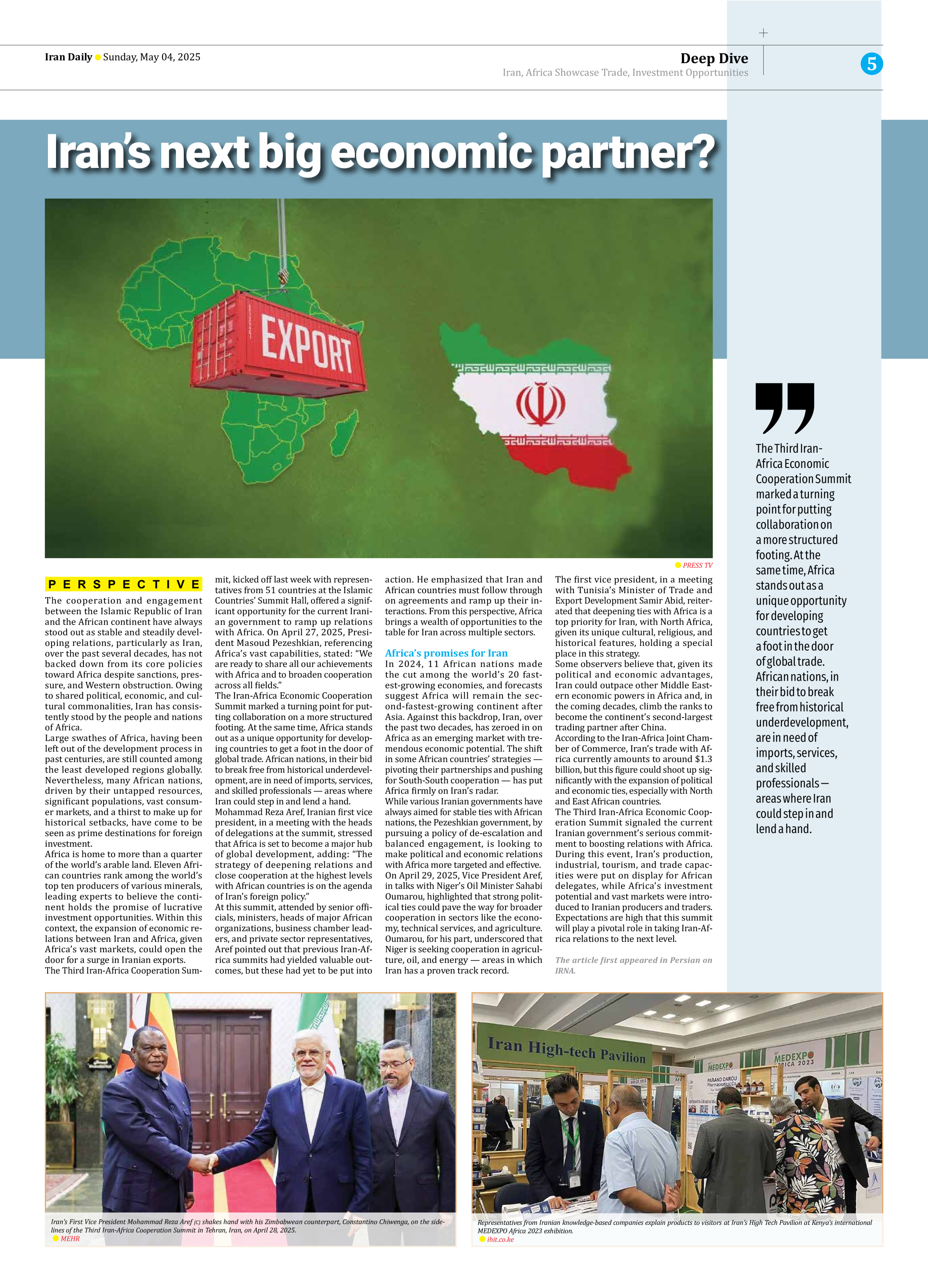
Iran’s next big economic partner?
The cooperation and engagement between the Islamic Republic of Iran and the African continent have always stood out as stable and steadily developing relations, particularly as Iran, over the past several decades, has not backed down from its core policies toward Africa despite sanctions, pressure, and Western obstruction. Owing to shared political, economic, and cultural commonalities, Iran has consistently stood by the people and nations of Africa.
Large swathes of Africa, having been left out of the development process in past centuries, are still counted among the least developed regions globally. Nevertheless, many African nations, driven by their untapped resources, significant populations, vast consumer markets, and a thirst to make up for historical setbacks, have come to be seen as prime destinations for foreign investment.
Africa is home to more than a quarter of the world’s arable land. Eleven African countries rank among the world’s top ten producers of various minerals, leading experts to believe the continent holds the promise of lucrative investment opportunities. Within this context, the expansion of economic relations between Iran and Africa, given Africa’s vast markets, could open the door for a surge in Iranian exports.
The Third Iran-Africa Cooperation Summit, kicked off last week with representatives from 51 countries at the Islamic Countries’ Summit Hall, offered a significant opportunity for the current Iranian government to ramp up relations with Africa. On April 27, 2025, President Masoud Pezeshkian, referencing Africa’s vast capabilities, stated: “We are ready to share all our achievements with Africa and to broaden cooperation across all fields.”
The Iran-Africa Economic Cooperation Summit marked a turning point for putting collaboration on a more structured footing. At the same time, Africa stands out as a unique opportunity for developing countries to get a foot in the door of global trade. African nations, in their bid to break free from historical underdevelopment, are in need of imports, services, and skilled professionals — areas where Iran could step in and lend a hand.
Mohammad Reza Aref, Iranian first vice president, in a meeting with the heads of delegations at the summit, stressed that Africa is set to become a major hub of global development, adding: “The strategy of deepening relations and close cooperation at the highest levels with African countries is on the agenda of Iran’s foreign policy.”
At this summit, attended by senior officials, ministers, heads of major African organizations, business chamber leaders, and private sector representatives, Aref pointed out that previous Iran-Africa summits had yielded valuable outcomes, but these had yet to be put into action. He emphasized that Iran and African countries must follow through on agreements and ramp up their interactions. From this perspective, Africa brings a wealth of opportunities to the table for Iran across multiple sectors.
Africa’s promises for Iran
In 2024, 11 African nations made the cut among the world’s 20 fastest-growing economies, and forecasts suggest Africa will remain the second-fastest-growing continent after Asia. Against this backdrop, Iran, over the past two decades, has zeroed in on Africa as an emerging market with tremendous economic potential. The shift in some African countries’ strategies — pivoting their partnerships and pushing for South-South cooperation — has put Africa firmly on Iran’s radar.
While various Iranian governments have always aimed for stable ties with African nations, the Pezeshkian government, by pursuing a policy of de-escalation and balanced engagement, is looking to make political and economic relations with Africa more targeted and effective.
On April 29, 2025, Vice President Aref, in talks with Niger’s Oil Minister Sahabi Oumarou, highlighted that strong political ties could pave the way for broader cooperation in sectors like the economy, technical services, and agriculture. Oumarou, for his part, underscored that Niger is seeking cooperation in agriculture, oil, and energy — areas in which Iran has a proven track record.
The first vice president, in a meeting with Tunisia’s Minister of Trade and Export Development Samir Abid, reiterated that deepening ties with Africa is a top priority for Iran, with North Africa, given its unique cultural, religious, and historical features, holding a special place in this strategy.
Some observers believe that, given its political and economic advantages, Iran could outpace other Middle Eastern economic powers in Africa and, in the coming decades, climb the ranks to become the continent’s second-largest trading partner after China.
According to the Iran-Africa Joint Chamber of Commerce, Iran’s trade with Africa currently amounts to around $1.3 billion, but this figure could shoot up significantly with the expansion of political and economic ties, especially with North and East African countries.
The Third Iran-Africa Economic Cooperation Summit signaled the current Iranian government’s serious commitment to boosting relations with Africa. During this event, Iran’s production, industrial, tourism, and trade capacities were put on display for African delegates, while Africa’s investment potential and vast markets were introduced to Iranian producers and traders. Expectations are high that this summit will play a pivotal role in taking Iran-Africa relations to the next level.
The article first appeared in Persian on IRNA.







